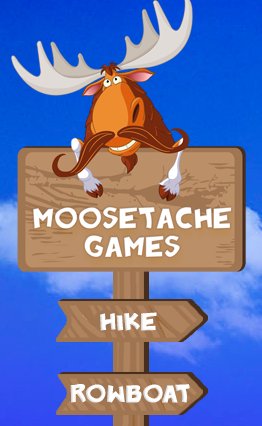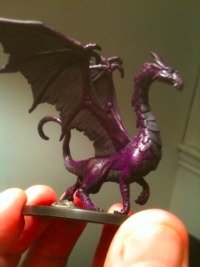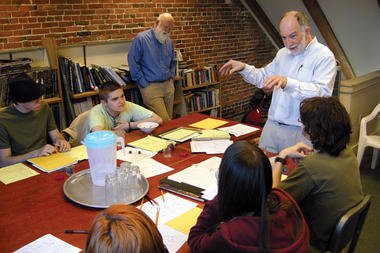Best games against social isolation
I was asked by the Boston Globe to recommend my favorite games --- board and card games, charades-type games, and role-playing games --- to play in person with your quarantine crew or online via video conference. In the story, I recommend Cards against Humanity, Dungeons & Dragons, and Pandemic.
Here are some of my picks that didn't make it into the story:
Here's the full story.
A Slide Lecture Adventure
 Thursday Dec 5 I'll be reading / presenting/ geeking out at Tufts University, thanks to an invitation from the Tufts student Science Fiction Fantasy Society.
Thursday Dec 5 I'll be reading / presenting/ geeking out at Tufts University, thanks to an invitation from the Tufts student Science Fiction Fantasy Society.
Thursday Dec 5 I'll be reading / presenting/ geeking out at Tufts University, thanks to an invitation from the Tufts student Science Fiction Fantasy Society, mysteriously called "Beyond the Light." I'll be showing some slides about my adventures through geekery and fantasy and gamery worlds. There will be a trivia contest, and some give-aways, and I'll sign books afterwards. I even heard there will be grub! Yee haw. Looking forward to it. Free and open to the public, too. More info here on my events page.
Soylent Green, and Gaming, Is People: Final Thoughts From Gen Con
 Is your Basic D&D set worth millions?The booths have been dismantled, the games put away, the green goblin face paint washed off, and the last of the trolls, pirates and grognards have been swept from the halls of the Indiana Convention Center.
Is your Basic D&D set worth millions?The booths have been dismantled, the games put away, the green goblin face paint washed off, and the last of the trolls, pirates and grognards have been swept from the halls of the Indiana Convention Center.
Gen Con may be over, but the ongoing campaign is not.
While of course the main reason gamers flock to Gen Con is to demo new product releases – and for sure, there were oodles of new merch on the convention floor, from Fantasy Flight Games’s Star Wars card miniature games to Wizards of the Coast D&D Neverwinter campaign setting – what I noticed, above all, was the spirit of gaming.
There's an ad in the Indianapolis Airpoirt about "gaming," but that ad means casino gambling: poker, blackjack, slots. What I mean, and what Gen Con ultimately aims to promote, is true gaming. Play that's not about beating the system or bilking other players of their riches, but sharing the experience of adventure and fun.
Gaming is people. (Soylent Green is also people, but that's another story.)
Reflecting back on my four days at Gen Con Indy, here are some final words about the power of table-top and role-playing games.

 All weekend long, I wandered the vendor floor, the hallways and game rooms, but I kept returning to the Gen Con auction. Here, folks unload old games of all types, from D&D products to an old copy of Tunnels and Trolls to a forgotten board game like Dark Tower or Pac-Man. On Friday night, the best of the best collector items were bid on and bought. I watched Kask and fellow TSR veteran game designer Frank Mentzer (founder of the Role-Playing Games Association), both serving as auctioneers, scrutinize an old D&D Basic set, trying to ascertain whether it was a first or third printing and whether the shrink wrap and Toys “R” Us sticker were authentic. I was fascinated by the love and passion these games attract, as well as the desire to get the details right. And the humor: After the winning bid on that Basic set, the auctioneers tore open the shrink wrap to see what was inside. (Sorry, winner, it was nothing special.) The desire to know the "guts" trumped any persnickety OCDism to keep the package intact for posterity's sake.
All weekend long, I wandered the vendor floor, the hallways and game rooms, but I kept returning to the Gen Con auction. Here, folks unload old games of all types, from D&D products to an old copy of Tunnels and Trolls to a forgotten board game like Dark Tower or Pac-Man. On Friday night, the best of the best collector items were bid on and bought. I watched Kask and fellow TSR veteran game designer Frank Mentzer (founder of the Role-Playing Games Association), both serving as auctioneers, scrutinize an old D&D Basic set, trying to ascertain whether it was a first or third printing and whether the shrink wrap and Toys “R” Us sticker were authentic. I was fascinated by the love and passion these games attract, as well as the desire to get the details right. And the humor: After the winning bid on that Basic set, the auctioneers tore open the shrink wrap to see what was inside. (Sorry, winner, it was nothing special.) The desire to know the "guts" trumped any persnickety OCDism to keep the package intact for posterity's sake.
Thankfully, more than just old timers are keeping the old RPGs alive. Publishing collectives like The Old School Renaissance Group and voices like the Blog of Holding are intent on honoring the groundbreaking heritage of D&D. A downloadable gaming product called Old School Hack is doing its best to introduce a streamlined, D&D-like RPG experience to a new generation of players. “A hack of a hack of the original Red Box version of a certain popular hack-and-slash fantasy game,” is what the folks say about their wee little product. Old School Hack also won the best free product “gold” award at Gen Con’s ENnies, the game industry’s version of the Oscars/Emmys. I applaud Kirin Robinson, the man behind OSH, who humbly notes, “I’m certainly not any sort of professional game designer, just another hobbyist looking to put together a fun game.” Here are all ENnie winners.
[Side note: In a funny, tongue-in-cheeky move, at the ENnie awards ceremony, every time Wizards of the Coast won a silver or gold, the “Imperial Death March” theme from the Empire Strikes Back would sound. Hanging out at their spectacular, ruined castle booth a lot this weekend, I know Wizards has a sense of humor.]
 Moosetache Games: Teaching that not all kids games involve a video monitor and controllerSeriously, evil empire jokes and fancy booth bling aside, Gen Con also reminded me of about the enthusiasm of the hundreds of indie gamer designers who exhibit their dreams here. Their only hope? To get a few dozens players excited about their new adventure. Tiny companies, like Moosetache Games, who debuted their new card game Hike, a family card game that encourages cognitive learning and teaches children about nature, took the time to teach anyone who wanted to learn. After all, the best way to try a new game is to play it. And no better way than from the folks who make it.
Moosetache Games: Teaching that not all kids games involve a video monitor and controllerSeriously, evil empire jokes and fancy booth bling aside, Gen Con also reminded me of about the enthusiasm of the hundreds of indie gamer designers who exhibit their dreams here. Their only hope? To get a few dozens players excited about their new adventure. Tiny companies, like Moosetache Games, who debuted their new card game Hike, a family card game that encourages cognitive learning and teaches children about nature, took the time to teach anyone who wanted to learn. After all, the best way to try a new game is to play it. And no better way than from the folks who make it.
I also hung out with the folks behind an exciting new project, Dungeons & Dragons: A Documentary, who (like me) aim to tell the whole story of how a simple yet innovative, fantasy role-playing game changed the course of millions of lives, and the history of our culture. And how D&D is still inspiring people to be creative writers, thinkers, and problem-solvers .
And I spoke to Gail Gygax, wife of the late Gary Gygax, and their son Luke Gygax, who are intent on making sure that the legacy of Gary and his contributions to the game are remembered. They both gave a moving tribute to Gary at the ENnie awards. And their Gygax Memorial Fund is still soliciting donations. You can even record your own video testimonial for the website.
Which brings me back to my over-aching feeling upon departing Gen Con: that table-top, roleplaying gaming is really about people. Gaming brings folks together around a table to banter and bargain and be boisterous. To share a playful experience outside of work, responsibilities, outside of the boxes we have drawn around ourselves. Adults need as much free, unstructured down time as kids. Let’s not forget that. We need to goof off, too.
And as cool as richly-imagined digital worlds can be, in game playing, it's the quality and passion of the company around the living room table that count, not the impressive gadgets and graphics. This is a lesson we especially should teach kids, who need to understand that not all games need involve a video monitor and a digital graphics. The power of the raw imagination needs to be preserved.
Hope to see you at next year’s Gen Con (or any of the hundreds of smaller game cons that have sprung up, including Gary Con IV in March, 2012, where you can game with many gaming legends).
Now, go play a game. Have fun.
Real-Life Role-Playing
Real-Life Role-Playing
 When Max Delaney came to rural Maine 13 years ago, his itinerant family moved from town to town, school to school. With few social connections, he felt isolated. Like an outsider.
When Max Delaney came to rural Maine 13 years ago, his itinerant family moved from town to town, school to school. With few social connections, he felt isolated. Like an outsider.
"It was hard for me to find people," says Mr. Delaney, now 21. "I was searching for a community." His academic performance suffered, and he didn't get along with his teachers. "I did not do well with authority in school."
Then, the year his family arrived in Belfast, a coastal town of some 6,300 on Penobscot Bay, he discovered The Game Loft and finally found his tribe.
Similar to other youth-development organizations such as Outward Bound or Scouting, The Game Loft also fosters risk-taking, leadership, and camarad erie. But for kids who find the football gridiron to be a foreign world, The Game Loft immerses them in a different sort of team sport.
Via table-top role-playing games like Dungeons & Dragons (D&D), Game Loft members play characters armed not with football padding and hockey sticks but chain mail, broadswords, light sabers, and magic spells. Working together, they charge onto battlefields and explore underground dungeons, seeking valor in these imaginary realms.
"I took to [role-playing] immediately," Delaney says. He joined as a member of The Game Loft, then started volunteering as a staff member, and finally became an employee. Along the way, the games he played built up his character in the real world.
"Killing dragons is a challenge," says Ray Esta brook, The Game Loft's codirector and cofounder. His center connects dragon-slaying to the challenges life throws at you. Via gaming, kids test out "roles," but in a safe, nonschool environment, in order to become functioning adults in society – connected, compassionate, and caring. "Good things happen to kids who game," he says.
 Cofounder Ray Estabrook (standing) leads gamers in playing '1968: Gone but Not Forgotten,' a game he and his wife and co-founder Patricia created.
Cofounder Ray Estabrook (standing) leads gamers in playing '1968: Gone but Not Forgotten,' a game he and his wife and co-founder Patricia created.
"I was [at The Game Loft] to socialize with kids who had mutual interest not only in games but conversation," Delaney says. "It was a place to channel a lot of curiosity." Moreover, he was able to interact with kids of all ages, as well as adults, who treated him as an equal. "The level of respect we got at The Game Loft was different than [at] school."
The Game Loft addresses another concern: the proliferation of video games. In an age when parents worry about the potentially isolating and addictive effects of computer and console-based games such as World of Warcraft and Halo, The Game Loft offers an antidote. No electronic games are allowed within its doors. Rather, kids play games
like D&D and Star Wars Miniatures face to face, with pencils and paper and plastic figurines, not with pixels and high-bandwidth Internet connections. A role-playing game is participatory, not passive. The kids don't absorb prefab plots from movies, books, or video games, but tell their own stories of their characters' exploits. Players around a
gaming table interact, completing quests and, yes, killing monsters who stand between them and their booty. In their imaginations, they are linked to humankind's narrativemaking past of heroic ballads and campfire tales of derring-do.
Each weekday at about 2 p.m., between 15 and 35 kids ages 6 to 18 (about one-quarter of them girls) break down the front door, pour up the stairs, and burst into The Game Loft's "Great Hall." The adjacent kitchen serves up hot food, sometimes the only nutritionally sound meal kids might get all day. They grab a brownie or bowl of chicken soup, separate into small groups (usually fewer than eight players) and head to the various rooms that host the game sessions. Once settled and fed, the kids quickly get down to the business of role-playing as elves and wizards, or plotting strategy as Jedi knights and military commanders.
But an unsupervised, free-for-all role-playing game can be just as cruel as a playground game of dodgeball. That's why game moderators like Tom Foster structure "intentional games" with outcomes that reinforce the center's principles such as fair play and cooperation.
In one room, called "The Savage Room" and decorated with maps and a suit of armor, Mr. Foster, who has been playing D&D since the 1970s, ran a multiweek, modified D&D game. He schooled his 12-to-15-year-old protégés in surviving the elaborate dungeon he'd designed and stocked with traps and monsters.
But when the adventuring party – "a group of misfits," as Foster affectionately called them – stepped on a tripwire, a cage opened that unleashed a bloodthirsty rhino.
Hands shot up, offering solutions. "I'm going to hide!" one girl shouted. "I've got an epic plan!" blurted another. "I want to jump on its back!" said another, whose character, inexplicably, took his clothes off and, via magic, turned invisible.
"Hold it, everyone! Focus," Foster said. "You've got a very large animal with three horns after you and you're arguing among yourselves." Eventually, they tricked the rhino into running into a vault and slammed the door. Success.
"Here, the idea is to get them from playing a game to solving problems," Foster later says. "To integrate."
Still, parents can be skeptical of the pedagogical goals. Some think their kids are just goofing off, says Kali Rocheleau, director of volunteers and membership. "But once we get them in the door, they have that 'aha' moment."
Sian Evans, whose two sons are Game Loft regulars, was one of those leery parents. She was no fan of video games, either, and wondered if fantasy games were too violent. But once she observed her sons in action, she noticed them begin to pass not only Pokémon cards back and forth across the gaming table, but also concepts.
"When you're playing D&D, you're talking about ideas," Ms. Evans says. "It's not games, it's life skills." She recalls a time that Taran, her 11-year-old, came home bubbling with enthusiasm about what had happened that day in the game: "Oh Mom, I got turned into a dwarf!"
"This is so special to him because he's active, he's part of the story," Evans says. "[Taran] would like to put a bunk bed in and live [at the Loft]."
The Game Loft's tools and settings aren't all fantasy. One custom-made game, 1968: Gone but Not Forgotten, re-creates life in a galaxy not so far, far away: Maine. "It's role-playing in an imaginary county, but touching on real history," says Patricia Estabrook.
"Our Maine history game is Dungeons & Dragons without the dungeons or the dragons," Ray Estabrook adds.
Games that let kids inhabit other selves from local history give them a stake in their own community. So do service projects that ask teens to take a break from battling orcs to give back. Townspeople see teens engaged in work like shoveling sidewalks for the elderly, not loitering downtown.
"It's important for youth to be involved in the community, not stuck behind some walled high school perimeter," Ray says.
For those at risk of dropping out of high school, The Game Loft can provide empowerment, accountability, and a way back in. Take Damion Saucier, 17, who felt oppressed by his school's educational system. "Me and school never clicked," Damion says. But at The Game Loft, he found "a big family," learned how to work with others, and also learned the necessity of obeying authority – sometimes. Now he's recommitted to school and volunteering as a game-session leader, teaching next-generation geeks. They look up to him. "You are like a god to them," he says. "It gives you a sense of helping these kids be social, and they're having fun."
The Game Loft has managed to turn the lingering "gaming is antisocial" stereotype on its head.
As for Max Delaney, just this March, after 11 years, he left his job at The Game Loft. The small-town kid moved to the faraway realm of Portland, Maine. He felt a little nervous, but also confident. After all, he knew how to role-play.
"We role-play in all situations in our life. It's unconscious," Delaney says. A job interview is really just role-playing, he notes, and games are a gateway to interaction. "We want to try to be someone else for just a little while, to experiment with it, to see who we can
be and what others are."
Like a character in a D&D game, who outfits himself before an adventure, then gains experience and grows in mastery, Delaney is well prepared for his next adventure – be it a job in social services, teaching, or wherever his quest may take him.
Ethan Gilsdorf is the author of Fantasy Freaks and Gaming Geeks: An
Epic Quest for Reality Among Role Players, Online Gamers, and Other
Dwellers of Imaginary Realms, which comes out in paperback in
September. Contact him through his website, www.ethangilsdorf.com
